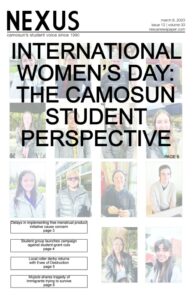If you’ve tried finding a suite to rent lately, you’ve been slapped in the face with the reality of living in Victoria. Whether it’s the exorbitant prices or the proliferation of short-term rentals, the fact remains that Victoria residents, and that includes a lot of students, are struggling to find, or keep, a roof over their head.
One of the worst trends is where landlords offer a one-bedroom or bachelor apartment but restrict residency to only one person. Often these same landlords charge upwards of $2,000 per month, leaving one person to pay the entire amount.
Why limit residency for couples? Many suites that are suitable for couples are listed as single occupancy only. Changing that is one way that politicians on the local and provincial level could get involved and help their citizens.

Victoria has failed its lower-income residents, but it doesn’t seem to bother City Council. While promoting affordable housing and recognizing the desperate need for it, Council actively pushes policies that are designed to benefit homeowner interests at the detriment to the renters living in the city.
For example, Victoria council announced zoning amendments that allowed homeowners to rent in an effort to create stock in the rental market, while simultaneously giving homeowners a chance to keep up with interest increases. The end result was more expensive rental suites.
As with all capitalist markets, others followed suit, and now one-bedroom apartments have skyrocketed to the point where some are over $2,000 a month. The problem is that Council made no effort to include language in the bylaw that would protect renters from discriminatory practices.
The statistics surrounding Victoria’s housing market are mind-boggling. In 2021, the City of Victoria published a report titled Victoria’s Housing Future, which states that the average median income for a couple without kids was $81,224 annually; the report included a breakdown of expenses, which left a surplus of $510 a month.
There are two issues with this metric: one, it hasn’t accounted for skyrocketing food and energy costs, and two, it fails to identify affordability for single residents.
The same report also indicated that 83 percent of Victoria households consist of 1 or 2 people (and 60 percent of Victoria residents live in rentals), but again didn’t calculate the cost of living in Victoria for one person.
Ironically, some one-bedroom apartments are being restricted to one occupant, but prices are being levied as a function of dual-income-no-kids.
All this doesn’t seem equitable. If we were to adjust the prices estimated in the City’s report for inflation and CPI, the projected budget would result in a monthly net loss, which would actually reflect what many people are experiencing in real life in 2023.
The City has failed to address affordability in any real way and has allowed further predatory practices that ultimately disadvantage lower-income people.
